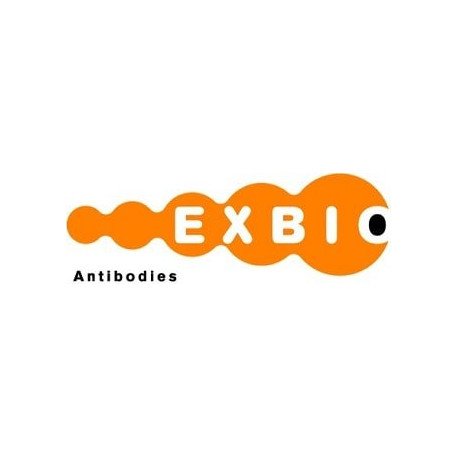Cart 0 Product Products (empty)
No products
To be determined Shipping
0,00 € Total
Prices are tax excluded
Product successfully added to your shopping cart
Quantity
Total
There are 0 items in your cart. There is 1 item in your cart.
Total products (tax excl.)
Total shipping (tax excl.) To be determined
Total (tax excl.)
Data sheet of Mouse Monoclonal to CD30
| Brand | Exbio |
| Product type | Primary antibodies |
| Reactivity | Human |
| Clonality | Monoclonal |
More info about Mouse Monoclonal to CD30
| Brand: | Exbio |
| Product no.: | 11-153-C025 |
| Product type: | Primary antibodies |
| Host species: | Mouse |
| Product name: | Mouse Monoclonal to CD30 |
| Antigen: | CD30 |
| Clonality: | Monoclonal |
| Clone: | Ber-H8 |
| Isotype: | IgG1 |
| Format: | purified |
| Specificity: | The mouse monoclonal antibody Ber-H8 recognizes extracellular part of CD30 (Ki-1 antigen), a 105 kDa single chain glycoprotein expressed on Hodgkin's and Reed-Sternberg cells; it is also found in Burkitt's lymphomas, virus-infected T and B lymphocytes, and on normal B and T lymphocytes after activation (T lymphocytes that produce Th2-type cytokines and on CD4+/CD8+ T lymphocytes that co-express CD45RO and the IL4 receptor). _x000D_ HLDA III; WS Code A171 _x000D_ HLDA IV; WS Code A105 _x000D_ HLDA V; WS Code A042 |
| Categories: | CD and Related Antigens (Human) |
| Concentration: | 1 mg/ml |
| Storage buffer: | Phosphate buffered saline (PBS) with 15 mM sodium azide, approx. pH 7.4 |
| Storage / stability: | Store at 2-8°C. Do not freeze. Do not use after expiration date stamped on vial label. |
| Background: | CD30 is a type I transmembrane glycoprotein of the TNF receptor superfamily. CD30 was originally identified as a cell surface antigen of Hodgkins and Reed-Sternberg cells using monoclonal antibody Ki-1. The ligand for CD30 is CD30L (CD153). The binding of CD30 to CD30L mediates pleiotropic effects including cell proliferation, activation, differentiation, and apoptotic cell death. CD30 has a critical role in the pathophysiology of Hodgkin's disease and other CD30+ lymphomas. CD30 acts as a costimulatory molecule in thymic negative selection. In addition to its expression on Hodgkin's and Reed-Sternberg cells, CD30 is also found in some non-Hodgkin's lymphomas (including Burkitt's lymphomas), virus-infected T and B cells, and on normal T and B cells after activation. In T cells, CD30 expression is present on a subset of T cells that produce Th2-type cytokines and on CD4+/CD8+ thymocytes that co-express CD45RO and the IL4 receptor. Soluble form of CD30 (sCD30) serves as a marker reflecting Th2 immune response. |
| Purity: | > 95% (by SDS-PAGE) |
| Purification: | Purified by protein-A affinity chromatography |
| Product specific references: | *Aalberse JA, Kapitein B, de Roock S, Klein MR, de Jager W, van der Zee R, Hoekstra MO, van Wijk F, Prakken BJ: Cord blood CD4+ T cells respond to self heat shock protein 60 (HSP60). PLoS One. 2011;6(9):e24119., *Falini B, Pileri S, Pizzolo G, Dürkop H, Flenghi L, Stirpe F, Martelli MF, Stein H: CD30 (Ki-1) molecule: a new cytokine receptor of the tumor necrosis factor receptor superfamily as a tool for diagnosis and immunotherapy. Blood. 1995 Jan 1;85(1):1-14., *Berro AI, Perry GA, Agrawal DK: Increased expression and activation of CD30 induce apoptosis in human blood eosinophils. J Immunol. 2004 Aug 1;173(3):2174-83., *Franke AC, Jung D, Ellis TM: Characterization of the CD30L binding domain on the human CD30 molecule using anti-CD30 antibodies. Hybridoma. 2000 Feb;19(1):43-8., *Matsumoto K, Terakawa M, Miura K, Fukuda S, Nakajima T, Saito H: Extremely rapid and intense induction of apoptosis in human eosinophils by anti-CD30 antibody treatment in vitro. J Immunol. 2004 Feb 15;172(4):2186-93. |
| Related products: | - Mouse Monoclonal to CD300e / IREM-2 - Mouse Monoclonal to CD30 / Ki-1 - Mouse Monoclonal to CD300a |
| Shipping condition: | Room temperature |


